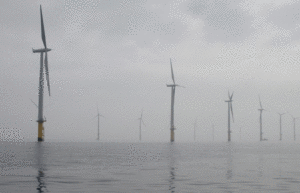 A new special issue of the academic journal Energy Research and Social Science guest edited by Dr Karoline Rogge, Dr Florian Kern and Prof Michael Howlett highlights the need to shift away from a one-instrument, ‘single bullet’ approach, towards well designed combinations of policy goals and instruments, otherwise known as ‘policy mixes’, in order to achieve a transition to a low-carbon economy. By developing a broad perspective on policy mixes and their design, the special issue explicitly addresses policy strategies, pays greater attention to the associated policy processes, encompasses the consistency, coherence and credibility of policy mixes, and also embraces the analysis of actors and institutions. The issue, which contains several contributions by scholars at the Centre on Innovation and Energy Demand, as well as the wider Science Policy Research Unit (SPRU), aims to showcase the latest conceptual thinking and empirical research on policy mixes for energy transitions. The contributions draw on a range of social science disciplines including environmental economics, innovation studies and policy sciences.
A new special issue of the academic journal Energy Research and Social Science guest edited by Dr Karoline Rogge, Dr Florian Kern and Prof Michael Howlett highlights the need to shift away from a one-instrument, ‘single bullet’ approach, towards well designed combinations of policy goals and instruments, otherwise known as ‘policy mixes’, in order to achieve a transition to a low-carbon economy. By developing a broad perspective on policy mixes and their design, the special issue explicitly addresses policy strategies, pays greater attention to the associated policy processes, encompasses the consistency, coherence and credibility of policy mixes, and also embraces the analysis of actors and institutions. The issue, which contains several contributions by scholars at the Centre on Innovation and Energy Demand, as well as the wider Science Policy Research Unit (SPRU), aims to showcase the latest conceptual thinking and empirical research on policy mixes for energy transitions. The contributions draw on a range of social science disciplines including environmental economics, innovation studies and policy sciences.
Dr Rogge said:
‘We wanted to increase the visibility of the topic of policy mixes for energy transitions within the field of energy research and promote innovative approaches by bringing together a multi-disciplinary collection of authors. We hope this special issue will stimulate further policy mix research that is diverse and enables better informed policy advice’.
Dr Kern added:
‘This special issue has been a great collaborative effort with Professor Michael Howlett of the Simon Fraser University in Canada and the National University of Singapore. Mike has been a globally leading researcher on policy mixes for many years and it was a real pleasure to work with him on this important topic. Here at SPRU we have a long tradition of innovative, interdisciplinary thinking and international collaborations on policy and transitions, and this special issue exemplifies that tradition‘.
The special issue is timely as policy makers are increasingly acknowledging that often a mix of measures is needed to achieve a particular aim. For example last month, the UK Department for Business, Energy and Industrial Strategy (BEIS) published a Call for Evidence on ‘Building a market for energy efficiency‘, which highlighted that there is no single ‘silver bullet’ policy for improving energy efficiency. Furthermore, in its 2015 report on system innovation the Organisation for Economic Co-operation and Development (OECD) referred to the relevance of policy mixes for redirecting innovation to addressing societal challenges. Finally, there is increasing policy interest in complementing existing policy mixes by instruments aimed at phasing out carbon-intensive technologies and practices, as evidenced for example by the UK’s plans to phase-out coal. The papers in this special issue will make a timely contribution towards these debates.
 The introductory article by Karoline Rogge, Florian Kern and Michael Howlett highlights ‘Conceptual and empirical advances in analysing policy mixes for energy transitions‘ and provides an overview of the fifteen articles included in the special issue. Among them, the special issue includes a paper by Jan Rosenow, Florian Kern and Karoline Rogge focusing on energy efficiency policy, titled ‘The need for comprehensive and well targeted instrument mixes to stimulate energy transitions: The case of energy efficiency policy‘. On the theme of policy mixes for creative destruction the special issue includes a paper looking at building energy efficiency in Finland by Paula Kivimaa et al. titled ‘Client-oriented evaluation of ‘creative destruction’ in policy mixes: Finnish policies on building energy efficiency transition‘ as well as a contribution by Karoline Rogge and Phil Johnstone highlighting innovation effects of the nuclear phase-out policy in Germany in a paper titled ‘Exploring the role of phase-out policies for low-carbon energy transitions: the case of the German Energiewende‘. The special issue also includes a paper by Phil Johnstone, Andrew Stirling and Benjamin Sovacool on nuclear power, shale gas and incumbency, titled ‘Policy Mixes for Incumbency: Exploring the destructive recreation of renewable energy, shale gas ‘fracking,’ and nuclear power in the United Kingdom.
The introductory article by Karoline Rogge, Florian Kern and Michael Howlett highlights ‘Conceptual and empirical advances in analysing policy mixes for energy transitions‘ and provides an overview of the fifteen articles included in the special issue. Among them, the special issue includes a paper by Jan Rosenow, Florian Kern and Karoline Rogge focusing on energy efficiency policy, titled ‘The need for comprehensive and well targeted instrument mixes to stimulate energy transitions: The case of energy efficiency policy‘. On the theme of policy mixes for creative destruction the special issue includes a paper looking at building energy efficiency in Finland by Paula Kivimaa et al. titled ‘Client-oriented evaluation of ‘creative destruction’ in policy mixes: Finnish policies on building energy efficiency transition‘ as well as a contribution by Karoline Rogge and Phil Johnstone highlighting innovation effects of the nuclear phase-out policy in Germany in a paper titled ‘Exploring the role of phase-out policies for low-carbon energy transitions: the case of the German Energiewende‘. The special issue also includes a paper by Phil Johnstone, Andrew Stirling and Benjamin Sovacool on nuclear power, shale gas and incumbency, titled ‘Policy Mixes for Incumbency: Exploring the destructive recreation of renewable energy, shale gas ‘fracking,’ and nuclear power in the United Kingdom.
Further information:
CIED project on Policy synergies and trade offs for low energy innovation